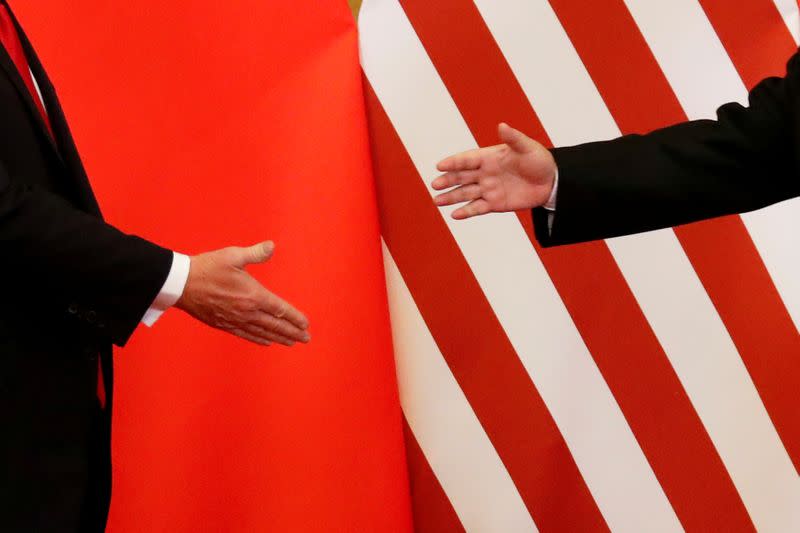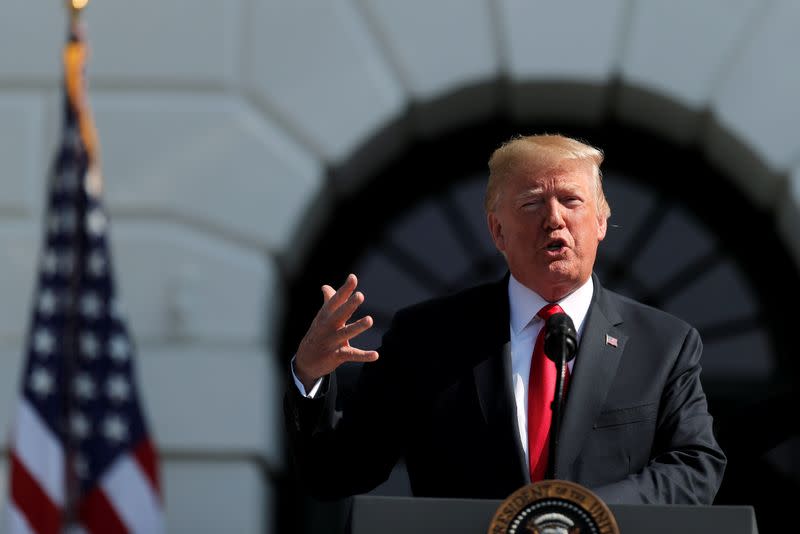Trump economist says 'uncertainty' from trade disputes hit business investment
By Howard Schneider
WASHINGTON (Reuters) - A slowdown in U.S. growth last year was at least partly the fault of President Donald Trump's global trade battles and the resulting hit to business investment, the administration's top economist said on Thursday in an outlook for the coming years.
"Once we got renegotiation of trade agreements, we saw uncertainty in the market, and investment took a hit," Tomas Philipson, acting chair of the Council of Economic Advisers, said in a briefing with reporters about the CEA's annual Economic Report of the President.
Philipson said the CEA had only done internal estimates of the impact but referred journalists to a Federal Reserve study that said trade uncertainty may have reduced growth in U.S. and world gross domestic products by as much as 1%.
Trump has blamed the Fed as the economy slowed from a 2.9% annualized growth rate in 2018 to 2.3% last year, and the central bank did trim rates three times to boost the economy.
But policymakers cited trade-related risks as a chief reason for the rate cuts. Philipson agreed with Trump that it was necessary to confront China on trade but said it did cause short-term disruption.
"I don't know if we fully agree on the quantitative point, but on the qualitative we certainly agree ... It is well known, if we have uncertainty, investment takes a hit," Philipson said.
It was a rare public acknowledgement from the administration of the costs of a trade war characterized as largely beneficial to the U.S. economy despite lingering questions about who pays the price of higher tariffs, whether global supply chains will be reorganized to the U.S. economy's benefit and even whether China will deliver on commitments made under a Phase 1 trade deal.
Philipson said he expects investment to rebound this year "if uncertainty settles down, which we hope it will."
The CEA report, an annual exercise that is one part review of events and one part aspirational statement, outlined what will likely prove key talking points for Trump's reelection campaign: The economy now is doing better than it did under President Barack Obama; it only started doing better under Trump and is poised to thrive even more if Trump administration proposals are enacted.
Those conclusions are likely to get pushback from Democrats who note that the jobs recovery, for example, began under Obama and accelerated in his second term.
A rise in the net worth of the poorest half of Americans, cited in the report and in Trump's recent State of the Union speech, has been largely driven by a rise in home ownership and home values that began late in Obama's term.
The CEA report projected economic growth this year will hit 3.1% and continue at 3% annually through 2024, as long as a full suite of suggested reforms are enacted including trade deals, an infrastructure plan and immigration rules that would favor more skilled workers.
Those changes, the CEA contends, would boost the annual increase in labor productivity from below 2 percent annually to 2.6 percent, a rate more akin to the high-growth 1990s than the more tepid growth of recent years.
Fed policymakers, whose forecasts do not take into account any of the administration's policy proposals, see the economy growing around 2% this year, with even the most optimistic seeing growth at no more than 2.3%, unchanged from last year's pace.
(Reporting by Howard Schneider; Editing by Dan Burns and Cynthia Osterman)

 Yahoo Finance
Yahoo Finance 

